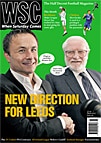 Theirs is still the only South American team never to qualify for a World Cup, but things are looking up for the football fans of Caracas as they emerge from the shadow of baseball. Rodrigo Orihuela explains
Theirs is still the only South American team never to qualify for a World Cup, but things are looking up for the football fans of Caracas as they emerge from the shadow of baseball. Rodrigo Orihuela explains
Since the iconoclastic Hugo Chávez became Venezuelan president in 1999, the country has become a fixture in the international political and financial press. Chávez’s fiery anti-American discourse, his friendship with Cuba’s ailing Fidel Castro and his recent drive against privately owned business corporations have cemented his place as one of the world’s leading maverick heads of state. Until recently, Venezuela made few football headlines. But Chávez is likely to use this year’s Copa América in Venezuela – the first played in the country – as a showcase for his policies, while the national team may give their baseball-mad president genuine cause for celebration.
As in most Latin American countries with strong cultural ties to the United States (such as Nicaragua, the Dominican Republic and the pre-Castro Cuba), baseball became popular in Venezuela in the early years of the 20th century. In 1941 the national team won the world amateur championship in Havana, the subsequent surge in interest leading to the creation four years later of a professional league. Since then the country has provided a steady supply of players to major US teams.
Venezuelan football, however, remained amateur until the 1950s. The national team, long referred to as the Cenicienta (Cinderella) of South American football, played their first match in 1938 but didn’t enter the World Cup or Copa América until the mid‑1960s, then won only two matches in their first 30 years of competitive football. Their various thrashings included a 10-0 defeat by Yugoslavia in a 1972 tournament in Brazil and an 11-0 away defeat to Argentina in the Copa América three years later. The only Venezuelan to play in Europe was striker Stalin Rivas (from a Communist family) who spent two unremarkable seasons in Belgium in the early 1990s.
But just as Chávez has raised the country’s political profile, so the qualifiers for the 2006 Germany World Cup proved that the Cenicienta are no longer a pushover. For the second time in succession, Venezuela finished off the bottom of the group (by one place), winning five of their matches, including a stunning 3-0 victory in Uruguay.
The man who gets most credit is national coach Richard Páez, a former player and a qualified doctor, who took over in 2001. South American fans have always appreciated the Venezuelan style of play, with the ball kept on the ground and passed quickly to feet. Unfortunately, the multiple passing movements tended to take place in their own half. Páez changed this. A great organiser, whose approach has even caught the eye of business-management gurus, he has convinced his players that they can match their opponents; Venezuela have gone from being a laughing stock to a team that can beat almost anybody at home.
Other moments, before Páez’s appointment, stand out as landmarks. In 1996, in the Argentine seaside city of Mar del Plata, the ten South American Under-23 teams played qualifiers for the Atlanta Olympics. In the group stage, Venezuela clinched second place behind Argentina (who would go on to win the silver medal). Even though the team didn’t win any of their three pool games, they finally proved themselves to the Venezuelan public.
Two years later, largely the same squad of players won the football tournament at the Central American and Caribbean Games (to which Venezuela is invited, although it also participates in the Odesur, the South American equivalent). The third big moment arrived the same year with the appointment of experienced Argentine coach José Pastoriza. When he was driving to watch his first game, Pastoriza was impressed by the deafening sounds of the crowd as he approached the Olímpico stadium. However, once inside the venue, he was stunned to see empty terraces and was promptly told that the yelling fans were in the nearby Universitario stadium, watching the national baseball derby between Caracas and Magallanes.
It was under Pastoriza that the team clinched their first South American away win, defeating Ecuador 2-0 in 1999. Having helped to create a more positive approach, Pastoriza left in 2000 and was succeeded the following year by Páez, who had been coaching national youth teams.
Private firms have joined the government in channelling funds into football. One of the knock-on effects of this year’s Copa América is that many clubs will be left with refurbished stadiums. The burgeoning success of the national side has led to an increase in the number of match-going fans, mainly outside the capital Caracas, in cities such as Maracaibo and Mérida. Tempted away from baseball and basketball, the new generation have formed raucous ultrà groups, chanting and carrying banners at matches, both previously unheard of.
These fans are likely to pack the stadiums to watch Brazil, Argentina and the rest at the Copa América in June and July, while President Chávez hopes that Venezuela rise to the challenge and give him the chance to brag about something other than his oil money.
From WSC 241 March 2007. What was happening this month